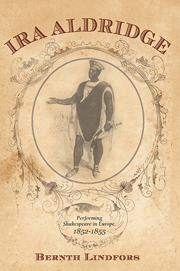Book contents
- Frontmatter
- Contents
- List of Illustrations
- Acknowledgments
- Abbreviations
- Introduction
- 1 Making Up a Company
- 2 Brussels
- 3 Navigating up the Rhine
- 4 Moving into the Interior
- 5 Berlin
- 6 On to Vienna
- 7 Hungarian Rhapsodies
- 8 Comparisons and Contrasts
- 9 Personal and Personnel Matters
- 10 Hungarian Rap Sheet
- 11 Prussia, Germany, Switzerland
- 12 Homeward Bound
- 13 Interpreting Shakespeare
- 14 Further Travels
- Appendixes
- Notes
- Selected Bibliography
- Index
- Miscellaneous Endmatter
Introduction
Published online by Cambridge University Press: 05 December 2013
- Frontmatter
- Contents
- List of Illustrations
- Acknowledgments
- Abbreviations
- Introduction
- 1 Making Up a Company
- 2 Brussels
- 3 Navigating up the Rhine
- 4 Moving into the Interior
- 5 Berlin
- 6 On to Vienna
- 7 Hungarian Rhapsodies
- 8 Comparisons and Contrasts
- 9 Personal and Personnel Matters
- 10 Hungarian Rap Sheet
- 11 Prussia, Germany, Switzerland
- 12 Homeward Bound
- 13 Interpreting Shakespeare
- 14 Further Travels
- Appendixes
- Notes
- Selected Bibliography
- Index
- Miscellaneous Endmatter
Summary
This book is a sequel to Ira Aldridge: The Early Years, 1807–1833 and Ira Aldridge: The Vagabond Years, 1833–1852, both published in 2011. The first volume dealt with Aldridge's formative experiences as a youth growing up in New York City, attending an African Free School, and occasionally witnessing plays produced at the Park Theatre and at William Brown's African Theatre, the first professional black theater in the United States. Aldridge's exposure to stage performances led him to aspire to become an actor, and, finding no opportunity to do so in America, he immigrated to England as a teenager and in 1825 made his debut as Othello at the Royalty Theatre, a small playhouse in the East End of London. His success there won him a two-month contract at the larger Royal Coburg Theatre south of the Thames, where he performed in a series of melodramas and comedies set mainly in the slave culture of the West Indies. As the first black actor to attempt such roles on the British stage, he was something of a sensation but not one that was taken too seriously. His performances earned both good and bad reviews.
After this period of apprenticeship in London, he began seeking engagements for a week or two at a time in provincial cities and towns that had local acting companies. In such venues he tended to be received more kindly than in London, partly because audiences were genuinely surprised to discover that he had real talent, not just notoriety or exotic appeal. Those who came to the theater expecting to laugh at the exertions of a young, inexperienced black thespian came away with a chastened respect for the intelligence and sophistication with which he handled his roles. As time passed and his reputation grew, he found it easier to gain employment for longer periods in some of the larger cities, especially after he had expanded his repertoire to include a very popular farce—Isaac Bickerstaff’s The Padlock—as well as additional well-known melodramas.
- Type
- Chapter
- Information
- Ira AldridgePerforming Shakespeare in Europe, 1852-1855, pp. 1 - 6Publisher: Boydell & BrewerPrint publication year: 2013

